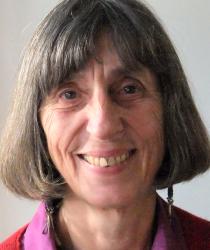
A musician, broadcaster, writer, teacher and much else besides, Di Ambache has enjoyed a life that has been varied and exploratory. Here she traces her passion for music from its earliest days to the present and ponders the impact that Bedales had on her career in all its different facets. “Of its time, it was enjoyably unconventional and it worked for me in many different ways” is her verdict of the place where she cultivated the habit of immersing herself in as many areas of life as possible.
“I think that my parents were idealistic and liberal when they sent my two brothers and me to Bedales and they felt that the school matched their own attitudes,” Diana (Di) Ambache recalls. “The arts, and above all music, were also important to them; this was another factor that made Bedales a good choice for me. Dad was an amateur musician and I started playing the piano at the age of five, not as any sort of prodigy, but always happily; music became my world from quite early on in life.”
To the young Di, her brothers were an important influence in those early days at Dunhurst. “As a person, I was a self-contained child and had no idea if there was a way to react when I first arrived in Steep,” she says. “I often followed what my brothers were doing, which meant that if they climbed a tree then I was likely to do the same. My brother Jonathan, who would later be tragically killed during the Biafran War at the age of 25, was known as Jimmy, and so I would regularly be called ‘Jimmy’s little sister’.”
Music remained one of Di’s principal touchstones throughout her Dunhurst and Bedales days. “Nancy Strudwick was an encouraging Head of Music so I became even more absorbed,” she says. “I was a cellist as well as a pianist and my major inspiration was my piano teacher Margaret McNamee. She was a lovely Irish lady, who had not the slightest hint of orthodoxy about her and would often introduce me to quite surprising stuff – for example, a late Brahms intermezzo and the Beethoven Choral Fantasia.”
It would be wrong to give the impression that Di’s entire Bedales existence was given over to the pursuit of her musical aspirations. “Certainly not,” says the former Bedales captain of lacrosse. “We three Ambaches were very sporty and used to score more than our share of points or goals. I remember Margaret McNamee being worried that my hands would get bashed as a result of my sporting activities! Long walks and exploring the beautiful countryside is something I enjoy now, though I was less enthusiastic about ‘wet runs’ when I was younger. I fondly remember David Sykes, who used to be in charge of outdoor work and was such a nice guy.”
“The broad base of activities at Bedales suited me; I grew into it, not least because it often involved collaboration, which was a valuable lesson that I drew from the school,” Di continues. “I am a performer and I love presenting to an audience. I have also found that the more people you have sharing in a project, the more satisfying the result as a whole, coming from the wider pool of individual contributions.”
The intellectual side of life was not always Di’s strongest suit at Bedales, as she is quick to admit: “I wasn’t in the least academic, even though I did enjoy being taught by a number of gifted teachers. George Smith was a real character, John Slater was another and of course there was George Bird as well – for some reason we were all absolutely sure that he was actually a spy. As I say, there were a lot of talented people to engage with at Bedales, both teachers and students. Although I didn’t have the same rapport with John Exton, who succeeded Nancy as Head of Music, he taught me through his wider view of the world.”
As had seemed inevitable from the start of her education, Di would follow her school days by heading down a musical route. “After Bedales, I went on to the Royal Academy of Music, where I was following in the footsteps of Martino Tirimo, the renowned concert pianist from Cyprus who was also an OB,” she explains. “I even studied there with the same teacher as Martino; I later realised this was a mistake because I was following a trail that had been laid by another, as opposed to finding my own path. So, I wanted to move on; I got my diploma rather quickly, and went to Sheffield University; there I studied music, Italian and psychology (my mother had been a psychoanalyst) and also played my first Mozart piano concerto in public.”
And so began the exacting and fulfilling life of the freelance musician for Di. “Effectively, that is what I’ve been ever since; as in my Bedales days, it was always my preference to play in collaboration with others,” she says. “I followed my nose, played with all sorts of different people, and met my husband, an oboist, with whom I’ve played and travelled around the world. We have performed in over thirty countries, including places such as Dar es Salaam, Brunei and elsewhere in South East Asia.”
In 1984, Di took the bold step of founding her own orchestra, the Ambache Chamber Orchestra, http://www.ambache.co.uk/records.htm, largely because she was determined to have the opportunity to play more of the Mozart Concertos. “I certainly blame Mozart for that decision, as well as what a friend of mine at Bedales, Jinny Fisher, used to call the Ambache Determination Factor, or ADF,” Di explains. “I had come to understand how much the Concertos meant to me and I liked the idea of doing them in a collaborative way but with me as something of a benign dictator!”
Over the course of the 24 years in which she ran her orchestra, Di and her colleagues played most of Mozart’s Concertos and recorded eight of them. However, of equal significance to her career was an event that took place only a year into her tenure when she stumbled upon a previously unknown piano concerto by Germaine Tailleferre. “No-one, even at Bedales, had ever mentioned any female composers, so this was a decisive moment for me,” says Di. “Back in those days, you barely heard any female composers in an average week on BBC Radio 3, for example, so there was a massive equality gap between the genders; for a long time any suggestions to alter the balance were completely ignored.”
From 1985, when she discovered the Tailleferre work, Di devoted at least part of her energy to researching, performing, recording and publicising music by women. “There has definitely been progress in the wider musical world towards the inclusion of music by women,” she acknowledges. “We are unlikely to see equality in my lifetime but compared to so many areas in which the pace of change has been glacial, music has at least shown visible and audible progress. And I’m delighted to say that my husband has been very supportive in the effort to bring about the necessary improvement – it was he who helped me to set up my information website dedicated to music by women (this is Women of Note – www.womenofnote.co.uk).”
Di was short-listed for the 2002 European Women of Achievement awards for her pioneering work in this field, including her website and broadcasts for the BBC and Classic FM, plus numerous recordings. Since then, the scope of her activities has become even broader. After inheriting a valuable violin, for instance, she sold it, using some of the funds to raise the profile of music by women; the purpose of the Ambache Charitable Trust (www.ambachecharitabletrust.org) is to support people giving concerts, making recordings, radio or television programmes, or publishing music and books in ways that bring significant attention to the work of female composers.
2021 saw the publication of her first book: The Soul of the Journey is her account of the music and art inspired by the journeys of Fanny and Felix Mendelssohn to Scotland and Italy; (“I find Fanny the more interesting character of the two!” she notes). Cambridge University Press issued Grażyna Bacewicz, the First Lady of Polish Music in 2022. Meanwhile, Di has also acted as a specialist lecturer and tour guide on cultural tours to various European Festivals. She trained as a teacher of English as a foreign language in 2011, and further enabled her interest in travel by teaching in such far-flung locations as India, Laos and Peru.
Expanding on the variety provided by Bedales, Di has savoured diversity in many areas. “I’ve enjoyed it all, including the business of getting into researching and writing,” she says. “Music and words are both at their best as forms of communication when they are being expressive and that’s what I’ve attempted in my books, although I’m sure my old English teachers at Bedales would have been quite tough on my efforts.”
Looking back at her Bedales days still gives Di quiet but genuine pleasure. “I liked being with so many interesting people with such diverse skills and abilities,” she says. “In my opinion
to be a Bedalian is to be your own person, to be actively engaged, to have your own quirks, and to value integrity.
I remember the school as a liberal place that was of its time; agreeably eccentric, it worked for me in many different ways. Possibly my younger self would have been pleased by what I’ve done with my life and would have recognised the impact that Bedales had on that.”
Diana Ambache was interviewed by James Fairweather in Summer 2022.
